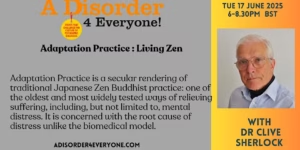Adaptation Practice – Living Zen
Adaptation Practice is a secular rendering of traditional Japanese Zen Buddhist practice: one of the oldest and most widely tested ways of relieving suffering, including, but not limited to, mental distress.
It deals directly with the root causes of upsetting and disturbing emotion.
This will all be new to most of us here because there is nothing like it in our Western cultural background. It is a radically different way of understanding and relieving human suffering, a paradigm shift away from the biomedical basis of psychiatry. It is not based on theory, dogma or opinion and it warns against analysing or naming and labelling our moods and feelings.
By following practical instructions on what to do and guidance on how to do it, emotional strength and insight develop in us. This is the most effective way known for clearing the mind and dealing with the upsetting emotion and disturbing thoughts that lie at the heart of our suffering.
Over the last 2,500 years millions of people throughout the Far East have found relief from even the most severe emotional suffering by practising the way of life that will be discussed in this talk. It entails a transformation of our understanding of what it is to be human and our habitual ways of reacting when life seems to go against us.
Information about Adaptation Practice, including a videoed interview, can be found on the website www.adaptationpractice.org
Get tickets here

